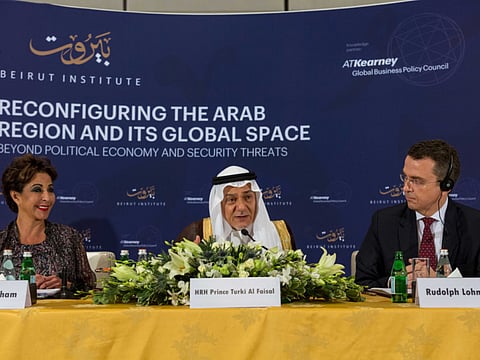Saudi prince stresses need to revitalise Saudi-Iran dialogue
Al Faisal welcomes Islamic military alliance formed by Saudi Arabia and calls for global cooperation

Abu Dhabi: Former Saudi intelligence minister Prince Turki Al Faisal stressed the importance of dialogue between his country and Iran during the Beirut Institute Summit.
The prince made the comments during a press conference on Sunday, announcing some of the policy recommendations that came out of the Beirut Institute Summit held in Abu Dhabi last year.
“We support the notion of regular discussions between Saudi Arabia and Iran. The bilateral relationship between Saudi Arabia and Iran arguably represents the single most important driver of the evolution of the Middle East geopolitically, economically and socially,” he said.
“A disciplined, energetic effort to regularise dialogue between these two powers is a critical imperative for the region and the world,” he added.
On the fight against terrorism and extremism, the prince welcomed the recent formation of the military Islamic alliance formed by Saudi Arabia, and called for more cooperation between Islamic countries in combating groups such as Daesh.
“The Islamic alliance is a pioneering movement and is a definite welcome, this is something that should have been done in the past, as it brings different Islamic countries together on the basis of countering terrorism, a consensus that all international countries agree on,” he said.
“Most victims and casualties of terrorism are Muslims, therefore we have a crucial role in confronting terrorism. It is not enough to deal with the symptoms only, we must go to the root causes and eradicate the disease,” he added.
With the Middle East facing a host of challenges, a settlement to the Palestinian-Israeli conflict remains high on the agenda for achieving stability within the region, said Al Faisal.
“There is a very strong recommendation that the Palestinian issue should be resolved, there are no question marks about this problem, and everybody knows the solution is the two-state solution with recognised borders as called for in the Arab Peace Initiative,” he said.
“The issue of Palestine continues to represent the core infected wound weakening the region. Resolving it remains crucial as a matter of justice and as a part of our efforts to counter and prevent violence across the region,” he added.
Sign up for the Daily Briefing
Get the latest news and updates straight to your inbox



